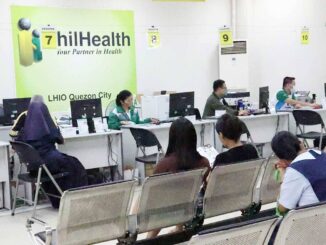
The benefits and contributions of members of the Philippine Health Insurance Corp. (PhilHealth) would remain intact and be unaffected by the state insurer’s remittance of its unutilized government subsidies back to the Bureau of the Treasury, Finance Secretary Ralph Recto said Tuesday.
“Samakatuwid, hindi mababawasan ang programang pangkalusugan ng PhilHealth (In fact, the health programs of the PhilHealth will not be reduced),” Recto said during the post-State of the Nation Address (SONA) forum in Pasay City.
“In fact, nabanggit nga ng Pangulo sa SONA niya na dadagdagan pa (the President even mentioned in his SONA that it will be supplemented),” the Finance chief said.
Recto noted that PhilHealth has P500 billion worth of reserve funds.
The Marcos administration’s chief economic manager said that even with the P89.9 billion in government subsidy remitted to the Treasury, it could hardly affect PhilHealth’s operations.
“Kahit tanggalin pa natin ‘yung P89.9 billion, meron pa ring P500 bilyon good for the next three years or more,” Recto said.
“Itong mahigit na P500 bilyon ay gagamitin pa sa mga bagong at pinalawak na benepisyo ng PhilHealth,” he said.
(Even if we remove the P89.9 billion, there is still P500-B that is good for the next three years or more.
This P500 billion will be used in the new and widened PhilHealth benefits.)
The DOF last week defended the utilization of unused and idle funds of government corporations, as it said this was “more prudent” than borrowing or imposing taxes to finance projects.
Several advocates questioned the diversion of billions of pesos in excess funds of government-owned and -controlled corporations (GOCCs) — specifically the PhilHealth — to fund unprogrammed appropriations this year.
The Finance Department said PhilHealth’s unused government subsidies “are not part of its reserve funds, nor income that is being restricted by the Universal Health Care Act to be used by the national government as a general fund.”
During the forum, Recto said the DOF was acting on orders of Congress, and it consulted the Governance Commission for GOCCs (GCG), the Office of the Government Corporate Counsel (OGCC), and the Commission on Audit (COA) which all said such moves were in line with the law.
“Nagkonsulta kami: ito ba ay ligal na pwedeng gawin? Tinanong namin ang GCG (Government Commission for GOCCs), OGCC (Office of the Government Corporate Counsel) at tsaka ang COA (Commission on Audit). Ang balik sa amin ng tatlong ahensiya ng pamahalaan, ligal lahat ito,” the Finance chief said.
(We sought consultations: is this a legal undertaking? We asked GCG, OGCC and the COA. All three government agencies responded that everything is legal.)
Recto also said that tapping the unutilized funds for unprogrammed projects such as those under the PhilHealth will significantly boost the country’s economy and help achieve the government’s target range.
“Sa ngayon, [For now] if you implement the unprogrammed, the study I saw is at least a potential increase of 0.8 (percent) of GDP (gross domestic product) and creation of roughly 600,000 jobs direct and indirect,” the Finance chief said.
Amid the remittance of PhilHealth’s unused funds to the government, Marcos, in his third SONA, announced that “dinamihan na ang klase ng generic na gamot na kasama sa benepisyo para sa mga outpatient (we have added the types of generic medicine that are included in the benefits for outpatients.).”
“Mula sa dalawampu’t isang generic na gamot, ay limampu’t tatlo na. May mga bagong gamot para sa altapresyon, at mayroon na rin para sa nerve pain at sa epileptic seizures,” the President.
(From 20 generic types of medicine, it’s now 53. There is new medication for hypertension, nerve nerve pain and epileptic seizures.)
Marcos also announced that in response to the increasing costs of medication and medical care, PhilHealth would improve benefits for members who suffer from strokes and pneumonia.
“Bilang tugon sa dumaraming insidente at tumataas na presyo ng pagpapagamot, itinaas na ng Philhealth nang mahigit doble ang mga benepisyo para sa mga malulubhang karamdaman, tulad ng acute stroke at pulmonya. Ang limit na ngayon para sa mga kundisyon na ito ay itinaas na hanggang pitumpu’t anim na libong piso at siyamnapung libong piso,” the President said.
(As a response to increasing incidents and the rise of medical treatment, PhilHealth has almost doubled the cost of benefits for serious illnesses, such as acute stroke and pneumonia.The limit for these types of condition has been increased to P76,000 and P90,000, respectively.)
The country’s chief executive also announced that PhilHealth members suffering from breast cancer could receive as much as P1.4 million in medical assistance.
“At bago matapos ang taon, maisasama na rin sa mga benepisyo ng PhilHealth ang chemotherapy para sa cancer sa baga, atay, ovary, at prostate,” Marcos said.
(Before the year ends, PhilHealth benefits will include chemotherapy for cancer of the lungs, kidneys, ovary and prostate.) —RF, GMA Integrated News





Be the first to comment